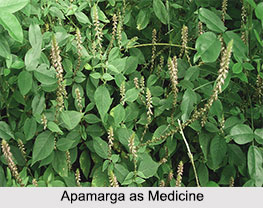 Apamarga, botanically known as Achyranthes aspera is one of the powerful Ayurvedic herb. Achyranthes aspera, this weed is chiefly valued on account of its ashes which contain a large quantity of potash.
Apamarga, botanically known as Achyranthes aspera is one of the powerful Ayurvedic herb. Achyranthes aspera, this weed is chiefly valued on account of its ashes which contain a large quantity of potash.
Health Benefits of Apamarga
The weed itself is described as heating like fire, laxative and a promoter of secretions; it is used in combination with other medicines of its class in ascites and anasarca. It is used to prepare a special medicine called "Kshara", used extensively in surgical procedures to treat fistula, and as oral medicine for obesity, tumors, etc.
Dose of Apamarga in Medicine
The ashes of Apamarga are used in the preparation of alkaline medicines and caustic pastes. The ashes mixed with orpiment are applied as a caustic to warts on the penis and other parts of the body.
Apamarga Taila: Take sesamum oil 4 seers, the alkaline water prepared from the ashes of Achyranthes aspera 16 seers, the ashes of the plant 1 seer and boil them together in the usual way. This oil is poured into the meatus in cases of noise in the ears and deafness.
This article is a stub. You can enrich by adding more information to it. Send your Write Up to content@indianetzone.com
Related Articles
Ayurveda
Ayurveda Medication
Elements of Ayurveda
Concepts of Ayurveda
Ancient Literature of Ayurveda
Sushruta Samhita




















